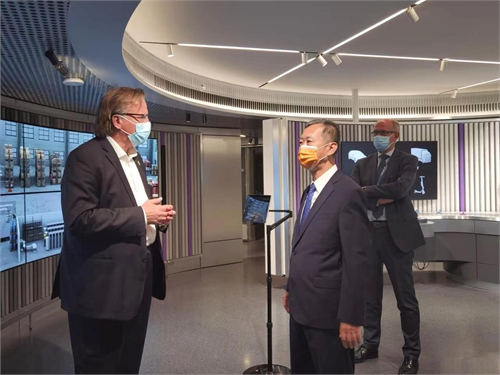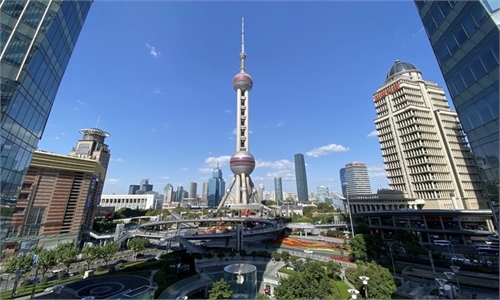China presides over revisions on rail, aerospace standards, aiming to be global leader
Nation presides over revisions on rail, aerospace criteria

Visitors watch a rocket launch on the big screen at the China Space Museum in Beijing on November 16, 2022. Photo: VCG
In recent days, an international standard on the general requirements for space systems involving ground support equipment (GSE) for use at launch, landing or retrieval sites - for which an institute under the China Academy of Launch Vehicle Technology (CALVT) leads in the revision - has been released, the Beijing Daily reported.
It is set to provide whole-process standards for GSE in carrier rocket launch sites in individual countries.
In 2017, the institute submitted a draft requirement to relevant international organizations, and after rounds of discussion, the institute was designated to lead in the revision of a previous standard unveiled in 2007, the report said.
CALVT told the newspaper that the release of the standard showed that there's increasing global aerospace industry recognition of China's experiences and achievements in carrier rocket GSE, with regard to product design, maintenance and quality management.
Huang Zhicheng, an aerospace expert, told the Global Times on Monday that the standard also demonstrated that "China has entered the ranks of countries with world-class aerospace technologies."
Based on the standard, China can provide support equipment for other countries that have certain spacecraft launch demands and assume international responsibility as a country with advanced aerospace technology, Huang said.
This revision adds to a flurry of international criteria that China has taken a global lead and made huge contributions.
A proposed standard that China submitted to the International Electrotechnical Commission on railway application technical criteria for coordination in neutral-section passing systems for trains - a specific technology for rail electrification -has obtained votes from the commission's global members. A new international working group on the project was officially set up, the Science and Technology Daily reported on Sunday.
It's the first time that China, with the world's longest high-speed rail (HSR) network, has presided over the revision of international standards for railway electrification technology, analysts said. This will lead to more global cooperation on China's HSR technology, and it will elevate Chinese enterprises' voice in global rail transport.
It also marks a new era in setting standards that drive technological progress, industry insiders said.
The lead in the railway sector will help exports of intellectual property and packed technologies, and increase China's influence in the field, Zhang Mingrui, a professor at the College of Electronics and Information Engineering of Tongji University, told the Global Times on Monday.
China has been chosen as the convener of the new working group, and it will organize railway experts from six other countries - Canada, France, the UK, Japan, Russia and Switzerland - in the next three years to draft the standard, according to the Science and Technology Daily.
China is also taking a head start in other hot areas of global technology competition such as 6G. According to the Ministry of Industry and Information Technology, China has set up an IMT-2030(6G) promotion group, a 6G technology research and development group and an experts' team to fast-track the development of the next generation of telecommunication technology. It also issued a white paper on the technology, identifying broad prospects and potential key technologies.
A spokesperson of China Mobile told the Global Times on Monday that the company proposed an overall 6G network architecture design last year, the first of its kind in the world.
Fu Liang, an independent tech analyst, told the Global Times on Monday that international telecom standard-making depends on a county's access to the most advanced technology and its patent pool.
"Backed by China's advantages in those two dimensions, the country will spearhead global efforts to set 6G standards, which are now being formulated," Fu said.
All the evidence points to China's increasingly irreplaceable role in global tech rule-making and its rising profile in the industry.
"Against the backdrop of the US-led relentless crackdown, the evolving role will also help China to expand global cooperation and reshape the competitive landscape," Fu said, while urging Chinese enterprises to participate more in the rule-making of strategic industries where the country strives to achieve self-sufficiency, such as semiconductors and software.



